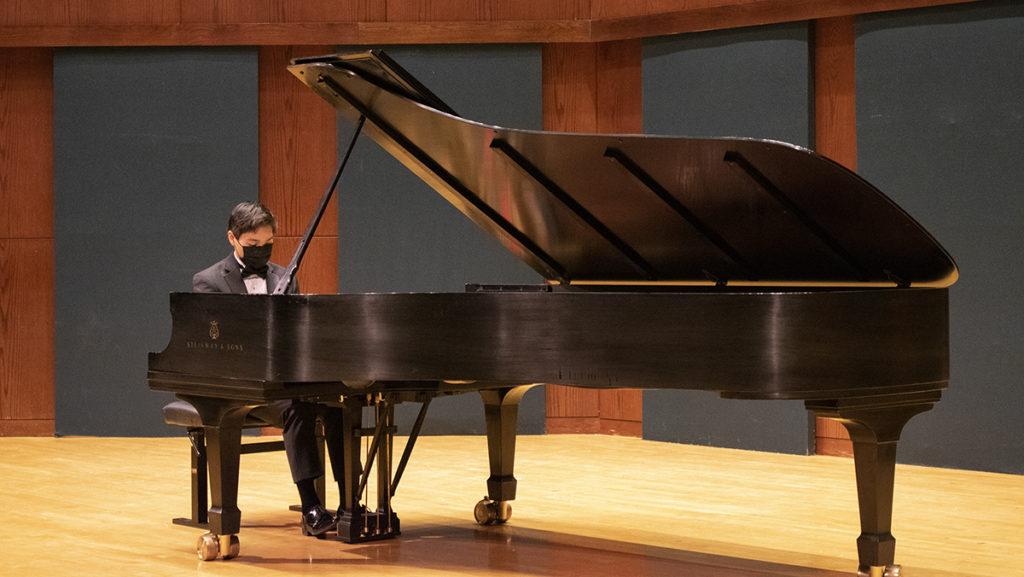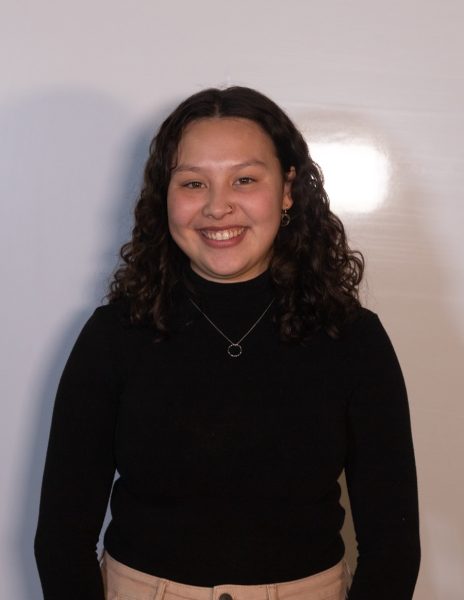Masked instrumentalists sit six feet apart, waiting anxiously to perform in person at the Ithaca College School of Music for the first time since the start of the pandemic. A small crowd files into the seats of Ford Hall, smiles underneath their masks as they get settled, excited to experience the joy of live music once again.
This semester, students at the School of Music have adjusted to a hybrid form of practice and performance. As of March 1, in-person concerts at the James J. Whalen Center for Music are accessible to students and faculty with limited seating. Concerts that require more space or have a larger number of performers are only open to those with an invitation.
In order to re-open Whalen safely, Interim Associate Dean Ivy Walz said she created a 36-page return plan featuring extensive research and safety precautions. Walz said this plan was then condensed into a webpage that shows the current safety status of the School of Music and what safety precautions accompany that status. Whalen can be at a green, yellow, orange or red level. As of March 23, Whalen is at a green level, the lowest level.
Instrumentalists must maintain 6-12 feet of distance and vocalists must maintain 12-20 feet of distance when performing. Groups and ensembles featuring aerosolized instruments, like wind instruments or vocalists, must perform in 30–minute increments with 25 minutes of space in between for the room to be aired out and purified. Appropriate personal protection equipment (PPE), like masks and bell covers, must be used when performing in groups. PPE may be removed when practicing alone with the door closed or for solo performances with recorded accompaniment and no live audience.
At the yellow level, all of the same precautions are expected, but students must use PPE at all performances and it is encouraged to use accompaniment that is pre-recorded or remote. At the orange level, solo practices are permitted, but students must use PPE at all times. Live performances for students in their final semester must be reviewed by the IC Health and Safety group and will only be livestreamed. All instruction must be virtual. At the red level, there is no performance, rehearsal nor instruction permitted in the building.
Freshman Alex Renzoni, a music education major, said returning to an in-person setting was nerve-wracking at first.
“It’s definitely been a learning curve,” Renzoni said. “I definitely have had to reacquaint myself with being comfortable in large group settings and reassure myself that we’re all taking the precautions that we need to be safe. But overall, I do feel safe.”
Walz said coming up with effective safety protocols and policies required collaboration with Interim Dean Keith Kaiser, Erik Kibelsbeck, manager of concerts and facilities, and other faculty members. Walz said the school also involved committees that discussed safety measures for aerosol producing instruments and general classroom safety.
“It really was a huge school-wide collaboration in terms of working together to understand the different instruments and the science available,” Walz said. “The science was evolving as we were working. We were pretty lucky that by the time we were ready to open in the spring, we felt confident that we could open safely with use of extra personal protective equipment.”
Senior Evan Schreiber, trumpet performance major, said he is excited to be performing in person.
“I don’t think any of us will take live music for granted,” Schreiber said. “While you could complain about the protective measures we need to take in order to play in person, it’s a breath of fresh air to be in the same room playing music at the same time, and getting back to what we’re used to.”
Renzoni said he is overjoyed to have live performances again, and that live music is something students need now more than ever.
“Live music right now is filling the void that so many of us desperately need to be filled,” Renzoni said. “It’s brought light to a place that’s been very dark for us for many, many months and I think that that’s been really refreshing for all of us in the School of Music, something that we’ve needed. Not just wanted but it’s in our blood it’s in our souls, we need it.”
Senior Anthony Pilcher, vocal performance major, said that although it is nice to be performing in person again, it has been stressful adapting to the new COVID-19 guidelines. Pilcher said planning and rehearsing for his senior recital has been a difficult adjustment.
“It’s honestly been extremely stressful,” Pilcher said. “Even just from an emotional standpoint, because I am giving a senior recital later in the semester, just knowing that my parents or any of my friends that aren’t students at the school can’t attend is kind of sad. But then even just from a logistical standpoint, it’s been super hard to try and plan things.”
Kibelsbeck said there are approximately 100 live concerts booked for this semester as compared to approximately 210 live concerts performed in 2019. Kibelsbeck said the number is lower this semester because elective recitals were not scheduled in main halls, there are no guest artists and remote students are not performing live.
Luke Klingensmith, webcast services coordinator for the school of music, said that in addition to live performances, all performances in Ford Hall and Hockett Hall will be livestreamed and approximately 30% of performances will be recorded, whereas only approximately 35 performances were livestreamed and recorded before the pandemic. In order to keep up with the high demand, Klingensmith said he hired more student video operators to operate controls, compile the videos from pan tilt cameras and mix audios for the livestream. Klingensmith said he had to get rid of the score readers who would look at the scores beforehand and decide what types of shots and production details could be added to enhance the performance.
Klingensmith said he thinks it is necessary that all events are livestreamed so that people living off campus can view the performances. However, he said he does not expect this feature to remain in place post-pandemic.
“I anticipate not doing this again,” Klingensmith said. “That’s the assumption, livestreaming something like this is more of an emergency feature because family members can’t be in the building. But once we can open back up to the public, we would go more or less back to normal. Score readers would come back, the number of video operators I have would be reduced again, and we would go down to livestreaming 35 concerts a semester.”
Pilcher said the pandemic has pushed him to become a more creative, expressive musician.
“I think that the greatest part about any challenge in general is what you can take from that to grow,” Pilcher said. “And so that’s just true of, I would say anything. And so especially with live performance, and even if you were looking at just singing in general, being put under the pressure and the limitations that are currently set in place only allow us to think in new ways and to come up with better ways of performing.”
Schreiber said that within the music field at large, he hopes musicians remain creative and continue making new music.
“I hope people don’t stop creating,” Schreiber said. “It’s scary, going into a field that doesn’t have a clear path. And with the world right now, everyone wants some stability. I just hope that people are brave enough to keep putting out content that they feel impacted by and that they think impacts others.”















